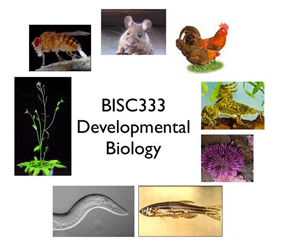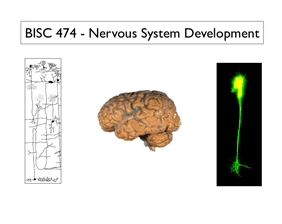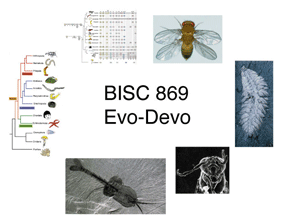Teaching
I am currently teaching the introductory Developmental Biology Course (alternating with other faculty members) and a new 4th year course in 'Nervous System Development' offered for the first time in the fall term of 2009. In addition our lab offers the opportunity to do laboratory based courses (BISC498/499) or independent study semesters (ISS) within the Honors Program.

BISC333: Developmental Biology
This is an introductory course in Developmental Biology. It focuses on a number of model organisms, plants, invertebrates and vertebrates. It addresses key questions in Developmental Biology like: How do cells in the developing embryo differentiate into specialized cells like neurons or muscle cells? How do these cells organize themselves to form an intact animal or plant? The course will deal with the sequence of events during embryogenesis (gastrulation, cell migration, cell differentiation, morphogenesis, organogenesis) at a descriptive level and explain developmental mechanisms at the molecular level with an emphasis on general principles.

BISC474: Nervous System Development
This is an introductory course in Developmental Neurobiology. It will cover various aspects of neuronal development beginning with the specification of neurons and regionalization of the developing nervous system in the early embryo. We will follow the birth and differentiation of neurons, their axon outgrowth and navigation as well as synaptic target selection and the formation and maturation of neuronal circuits. The various developmental processes will be presented using studies from both invertebrate and vertebrate model organisms with emphasis on the molecular basis of nervous system development. Selected topics will be explored in more detail using primary literature.

BISC869: Evolutionary Developmental Biology
Evolutionary Developmental Biology (‘evo-devo’) is a fast growing field in biology nowadays. This development was fuelled by the identification of developmental control genes in the last decades. Comparative studies of those genes have led to new insights concerning the origin of organs or certain morphological structures often contradicting ‘established views’. The course will cover selected topics in the Evo-Devo field like master control genes of eye development and the discussion about the origin of eyes (monophyletic versus polyphyletic); the surprising ‘non’conservation of the Drosophila morphogen ‘bicoid’; the origin of vertebrate and invertebrate central nervous systems; nematodes with widely different modes of early development as well as other topics.